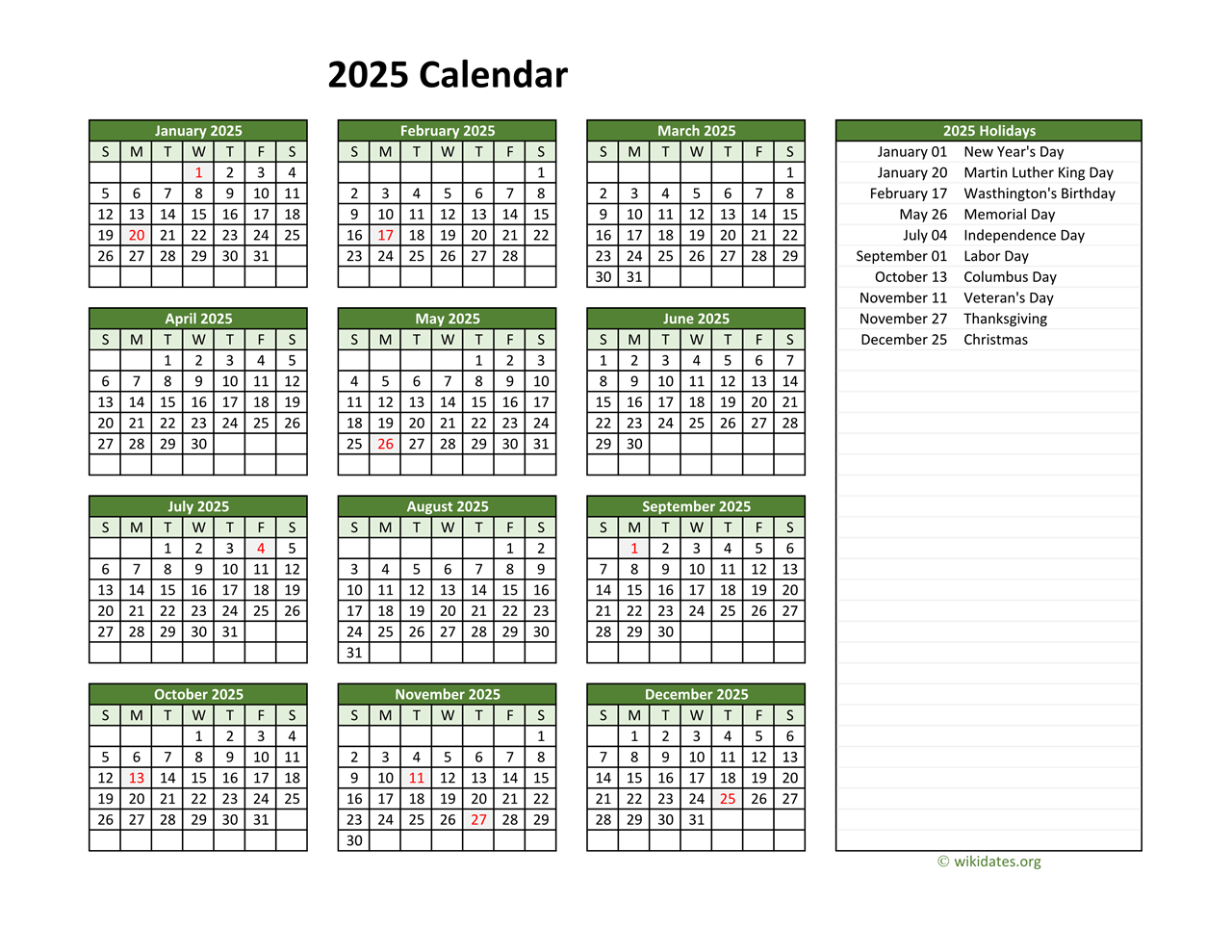Navigating the 2025 Federal Holiday Calendar: A Comprehensive Guide
Related Articles: Navigating the 2025 Federal Holiday Calendar: A Comprehensive Guide
Introduction
With enthusiasm, let’s navigate through the intriguing topic related to Navigating the 2025 Federal Holiday Calendar: A Comprehensive Guide. Let’s weave interesting information and offer fresh perspectives to the readers.
Table of Content
Navigating the 2025 Federal Holiday Calendar: A Comprehensive Guide

The federal holiday calendar serves as a crucial guide for businesses, organizations, and individuals alike. It delineates days when government offices and many businesses are closed, impacting work schedules, financial markets, and even personal plans. Understanding the 2025 federal holiday schedule allows for proactive planning, ensuring efficient operations and timely execution of tasks.
2025 Federal Holiday Calendar:
January:
- New Year’s Day (Wednesday, January 1): Marking the start of a new year, this holiday offers a chance for reflection and rejuvenation.
February:
- Presidents’ Day (Monday, February 17): Honoring the legacies of George Washington and Abraham Lincoln, this holiday celebrates the leadership and contributions of past presidents.
May:
- Memorial Day (Monday, May 26): A solemn occasion to remember and honor those who died in military service to the United States.
June:
- Juneteenth National Independence Day (Friday, June 19): Commemorating the emancipation of enslaved African Americans, this holiday signifies freedom and equality.
July:
- Independence Day (Wednesday, July 2): Celebrating the signing of the Declaration of Independence, this holiday marks the birth of the United States as a nation.
September:
- Labor Day (Monday, September 1): Recognizing the contributions of American workers, this holiday celebrates the labor movement and its achievements.
October:
- Columbus Day (Monday, October 13): Marking the arrival of Christopher Columbus in the Americas, this holiday is increasingly debated and reinterpreted.
November:
- Veterans Day (Wednesday, November 11): Honoring all veterans who have served in the United States Armed Forces.
- Thanksgiving Day (Thursday, November 27): A day of gratitude and feasting, celebrated with family and friends.
December:
- Christmas Day (Wednesday, December 25): A religious holiday celebrating the birth of Jesus Christ, observed by many as a time for family and celebration.
Understanding the Importance of Federal Holidays:
Federal holidays hold significant cultural, historical, and social value. They serve as:
- Markers of National Significance: Marking key events in American history, they offer opportunities for reflection and remembrance.
- Moments of Unity: Bringing people together for shared celebrations, fostering a sense of national identity and community.
- Time for Rest and Rejuvenation: Providing opportunities for rest, relaxation, and time spent with family and friends, promoting well-being.
- Economic Impact: Impacting business operations, financial markets, and consumer spending patterns, influencing economic activity.
Frequently Asked Questions (FAQs):
Q: Are federal holidays mandatory for all businesses?
A: While federal holidays are not legally mandated for private businesses, many observe them as a matter of custom or to align with employee expectations.
Q: Can businesses choose to observe different holidays?
A: Businesses have the discretion to observe other holidays based on their industry, location, or company culture.
Q: Do federal holidays affect financial markets?
A: Yes, federal holidays can impact trading hours and market activity, influencing stock prices and other financial instruments.
Q: Are there any specific rules regarding federal holidays and employee pay?
A: Laws governing employee pay during federal holidays vary by state. It is crucial to consult local labor regulations.
Tips for Navigating Federal Holidays:
- Plan Ahead: Anticipate potential disruptions and adjust work schedules accordingly.
- Communicate Effectively: Inform employees and stakeholders of holiday closures and any changes to operations.
- Consider Customer Needs: Ensure essential services remain available or provide alternative options during holiday periods.
- Utilize Technology: Leverage technology to streamline communication and manage operations remotely.
- Respect Cultural Diversity: Acknowledge and respect the significance of different holidays celebrated by employees and clients.
Conclusion:
The 2025 federal holiday calendar provides a framework for navigating important national observances. Understanding its significance, impact, and implications is crucial for businesses, organizations, and individuals. By proactively planning, communicating effectively, and respecting cultural diversity, we can navigate these holidays efficiently and meaningfully.








Closure
Thus, we hope this article has provided valuable insights into Navigating the 2025 Federal Holiday Calendar: A Comprehensive Guide. We thank you for taking the time to read this article. See you in our next article!
